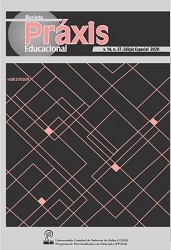KANT AND ANTHROPOLOGICAL DIDACTICS
DOI:
https://doi.org/10.22481/praxisedu.v16i37.6449Keywords:
Kant, Didactics, AnthropologyAbstract
Kant defines anthropology as a systematic doctrine that contains our knowledge of man and suggests that this knowledge can be given a physiological or pragmatic perspective. The first involves knowledge of the things of the world, or man as an object of and in nature; the second encompasses man's knowledge as an active, free being, as a citizen of the world. Kantian anthropology adheres to the pragmatic perspective and divides its material according to an anthropological didactic and an anthropological characterization. The work seeks to focus on the exemplification of anthropological didactics based on the Kantian approach to the topic of prudence (a certain art of living together in civilization), trying to demonstrate that at this point we find a philosophical anthropology associated with a markedly pedagogical process.
Downloads
References
CASTILLO, M. Introduction à l’anthropologie kantienne. Paris : École des Hautes Etudes en Sciences Sociales, 1996.
CASTILLO, M. Kant et l’avenir de la culture. Paris: Puf, 1990.
DESCARTES. Descartes à P. Mesland, 2 mai 1644. In Oeuvres de Descartes (Tome IV). Publiées par C. Adam & P. Tannery. Paris: Vrin, 1996.
DICTIONNAIRE ETYMOLOGIQUE. Paris : Centre National des Ressources Textuelles et Lexicales, 2012.
FOUCAULT, M. Introduction à l’Anthropologie. Paris : Vrin, 2008.
KANT, I. Antropologia de um ponto de vista pragmático. Trad. de Clélia A. Martins. São Paulo: Iluminuras, 2006.
KANT, I. Kant’s gesammelte Schriften. Herausgegeben von der Königlich Preussischen Akademie der Wissenschaften. Berlin, 1900.
- Kritik der reinen Vernunft (KrV)
- Metaphysik der Sitten (Metaphysik)
- Grundlegung zur Metaphysik der Sitten (Grundlegung)
- Beantwortung auf die Frage: Was ist Aufklärung? ( Was ist Aufklärung)
- Über Pädagogik (Über Pädagogik )
- Kritik der Urteilskraft (KU)
- Logik (Logik)
- Reflexionen (Reflexionen.)
MARROU, H-I. Histoire de l’éducation dans l’Antiquité. Paris : Seuil, 1948.
MENEZES, E. História e esperança em Kant. São Cristóvão/Aracaju: Editora da Universidade Federal de Sergipe/Fundação Oviêdo Texeira, 2000.
RUFFING, R. L’homme comme expression de l’inconditionné dans la natur. Trans/Form/Ação, São Paulo, 32(1): 37-53, 2009.
STARKE, Fr. Ch. (Hrsg.). Immanuel Kants Menschenkunde / nach handschriftl. Vorlesungen hrsg. von Fr. Ch. Starke ; im Anh., Immanuel Kants Anweisung zur Menschen- und Weltkenntnis, nach dessen Vorlesungen im Winterhalbjahr 1790-1791 hrsg. von Fr. Ch. Starke ; mit e. Vorbemerkung von Giorgio Tonelli. Hildesheim: Olms Verlag, 1976.
VANDEWALLE, B. Kant. Educación y crítica. Trad. de Horacio Pons. Buenos Aires: Nueva Visión, 2004.
VERGNAUD, G. Rapport Carraz. In: CARRAZ, R. Recherche en éducation et développement de l'enfant (Rapport au ministre de l'Industrie et de la Recherche). Paris: La Documentation française, 1983.
Downloads
Published
Issue
Section
License
Você é livre para:
Compartilhar - copia e redistribui o material em qualquer meio ou formato; Adapte - remixe, transforme e construa a partir do material para qualquer propósito, mesmo comercialmente. Esta licença é aceitável para Obras Culturais Livres. O licenciante não pode revogar essas liberdades, desde que você siga os termos da licença.
Sob os seguintes termos:
Atribuição - você deve dar o crédito apropriado, fornecer um link para a licença e indicar se alguma alteração foi feita. Você pode fazer isso de qualquer maneira razoável, mas não de uma forma que sugira que você ou seu uso seja aprovado pelo licenciante.
Não há restrições adicionais - Você não pode aplicar termos legais ou medidas tecnológicas que restrinjam legalmente outros para fazer qualquer uso permitido pela licença.












